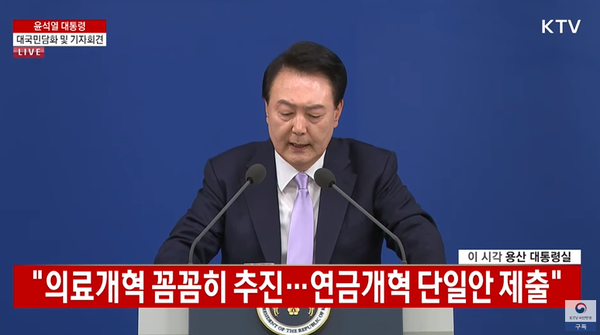President Yoon Suk Yeol confirmed that the medical school enrollment quota for 2025 will not change. He added that the enrollment quota for 2026 could be discussed at the trilateral consultative body of government officials, politicians, and doctors.
President Yoon reiterated his uncompromising stance at a nationally televised news conference on Thursday.

In his statement to the nation before the press conference, Yoon emphasized that he would proceed with healthcare reform calmly and meticulously.
“The four major reforms (including healthcare reform) are directly related to people's livelihoods and are aimed at protecting future generations,” Yoon said. “I will focus on ensuring that people can feel the benefits of the changes during the remaining two-and-a-half years in office.”
“I will implement healthcare reform calmly and meticulously so people do not worry,” he said. “There is strong resistance to reform, with calls for a careful approach to minimize patient discomfort. We will fight strongly for the country's future. Still, we will do so while keeping an eye on the people's minds and minimizing inconvenience.”
At the question-and-answer session that followed the speech, President Yoon reiterated that the increase in the number of medical school students, a critical factor in the ongoing dispute between the government and medical professionals, cannot be revised for the class of 2025, while that for the class of 2026 can be re-discussed.
“The College Scholastic Ability Test (CSAT) for the 2025 academic year comes on Thursday next week. The government has set next year's medical school enrollment quota. For the 2026 academic year, we have asked the medical community to give their opinions (on the number of students), so if doctors present reasonable opinions, the government will follow it.”
“If the discussion proceeds at the three-way commission and I need to meet with the opposition parties, I will do so. I will see how things progress,” Yoon added.
Apart from increasing the number of medical school students, Yun vowed to push ahead with healthcare reform quickly.
“Healthcare reform is not easy, but we have focused on what we can do without amending the law (for reform),” Yoon said, citing the government’s support for changing the structure of tertiary general hospitals and enhancing essential healthcare as such examples. “If surgeons are not compensated more than doctors who perform simple treatments, it is difficult to attract the right medical resources and talents for essential medical care.”
“We will speed up (reforms) by improving the compensation system for essential medical care and eliminating the indemnity health insurance system that wastes medical resources,” he added.
Yoon also stressed the need to address judicial risks for doctors.
“Doctors are sensitive to judicial risks when performing surgeries and first aid, and (to solve this problem) a liability insurance system should be designed, and lawyers representing both medical professionals and patients should collaborate on resolving medical lawsuits so that patients' families can maintain normal lives and doctors can continue treating patients,” Yoon said.
“If doctors are distracted and weakened by legal risks, they cannot treat other patients,” he said. “The government will speed up implementing these tasks to strengthen essential and regional medical care.”
Related articles
- Yoon vows to complete healthcare reform by pouring over ₩30 tril. in 5 years
- President Yoon calls for swift healthcare reform, urges reduced reliance on trainee doctors
- 2026 medical school admissions at risk, warns resigned doctors' representative
- Specialist shortage looms as only 576 trainee doctors eligible for next year’s exam
- Increase in medical students doesn’t lower educational quality? Studies say otherwise.
- Emergency medicine society criticizes government for misleading cause of ER congestion

